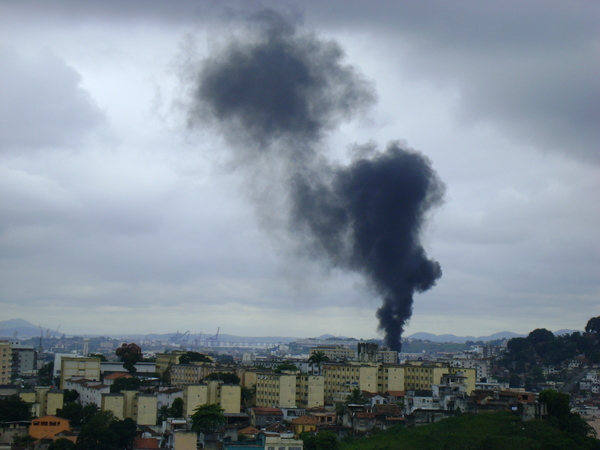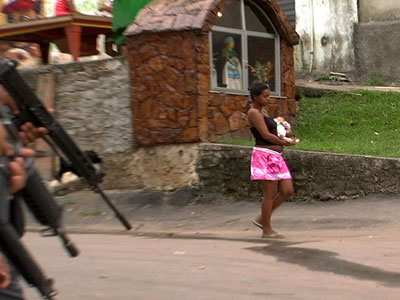Last week, images of a war between drug traffickers and dealers in Rio de Janeiro spread across the world. Clashes between gangs from the hills Morro São João and Morro dos Macacos on October 17th frightened the population. Hundreds of state police deployed in an effort to subdue rival gangs did not help: the conflict between drug dealers and police resulted in a downed police helicopter killing three police officers, and claimed the lives of over 30 other people, among them suspected gang members and bystanders.
The Censurado [2] [pt] blog criticizes the governors’ attitude toward this crisis, after hearing news suggesting that the police didn't know anyth [3]i [3]ng about the invasion [3]:
Vocês viram as cenas na televisão este fim de semana? Helicóptero caindo, policial morrendo queimado, inocente metralhado nas ruas e traficante invadindo a favela do outro em plena luz do dia, uma verdadeira cena de filme de guerra. Dizem no Rio que até o serviço secreto israelense sabia que um morro atacaria o outro, mas mesmo assim o governador Sérgio Cabral diz que a policia carioca não sabia de nada? Acho que ele anda passando muito tempo com o Lula. Só isso explica essa ‘ignorância’ sobre o tema.
Blogger Ana Maria [4] [pt] points out that shooting a helicopter down is not an easy task highlighting that this might be just the beginning. She says [5] [pt]:
Mas os senhores do tráfico, donos dos morros cariocas possuem não apenas as armas capazes disso, possuem indivíduos capazes de manuseá-las e causar um desastre como o do sábado.
Isso vai ficar marcado para sempre na memória da PM e do cidadão de bem, morador do estado do Rio de Janeiro.
Se eles podem fazer isso com um helicóptero da polícia tripulado por homens treinados, que dão a vida pela segurança pública, o que podem fazer com o cidadão comum?
Não vou “tapar o sol com peneira”.
As coisas podem piorar.
This will be forever marked in the memories of the Police and ordinary citizens, residents of the state of Rio de Janeiro.
If they can do this to a police helicopter manned by trained men, that give their lives to provide public safety, what can they do to the ordinary citizen?
I will not “hide the sun with a sieve”.
Things may get worse.
Dwellers’ accounts of the drug war
The citizen media project Viva Favela [7] [pt] gives some dwellers’ eyewitness accounts of this conflict [8]. Their citizen journalists – all of whom live at the frontier of the cross fire – have gathered comments from residents of the slums and photos of the day on which the drug war began in Rio de Janeiro.
The first person heard by Viva Favela was Hugo Mattos, who lives on the street that gives access to the slum in which all the events took place (Morro dos Macacos). He said that the dealers used high-caliber weapons and added that there is a kind of collective fear that if the police retake territory occupied by the traffickers, there will be a violent reaction from the faction that controls Morro dos Macacos:
O tiroteio começou por volta das duas da manhã e só terminou às oito horas, quando a policia chegou. Muita gente teve que dormir fora de casa nesse dia.
As pessoas dizem que ninguém deve sair de casa depois das 10 horas, porque algo pode acontecer.
According to Viva Favela, information like this comes all the time from the neighborhood dwellers, unable to react. On the evening of Tuesday October 20th, residents of Morro São João took to the streets afraid of a possible retaliation invasion, a fear which was classified as unfounded by the General-Chief of the police corporation, Colonel Mário Sérgio Duarte. Nevertheless, fear had already struck the population. Another resident of Morro dos Macacos, Karen Carolina Nascimento says that the shooting between dealers and the police has actually been happening for two months. She fears a new conflict:
Já era praticamente uma rotina, mas no último sábado foi diferente. O confronto aconteceu por causa de uma tentativa de invasão e não foi a primeira vez que os traficantes do Morro São João tentam. O comentário que se escuta no morro é que a facção rival deu uma ordem para tomar o Morro dos Macacos até dezembro e que esses bandidos tiveram ajuda de policiais para tentar invadir.
O policiamento não está reforçado e os moradores estão muito apreensivos com medo de uma outra invasão. Eu trabalho no pé do Morro São João e vou para a minha casa andando. Ontem só havia um único carro com dois policiais dentro parado em uma esquina. Em cima do morro não existe policiamento nenhum. Uma vez ou outra um carro blindado sobe e faz uma ronda. Estamos com muito medo porque com certeza a facção rival vai tentar tomar novamente.
Police patrols have not been reinforced and the residents are very apprehensive, fearing a new invasion. I work at the foot of Morro São João and I walk back home. Yesterday, there was only one car with two police officers inside parked on a corner. There are no police patrols up in the slum. Once in a blue moon a shielded car comes up here and patrols the area. We are in so much fear because we are sure the rival faction will try to reclaim the area.
Viva Favela [9] [pt] also offers the opinion of Wagner da Silva de Barros, a 29-year-old resident of Vila Pinheiro from Complexo da Maré, saying that the repercussions of the conflict in Morro dos Macacos have only reached this far because of the downed helicopter and adds that this war will spread to many other communities:
A queda do helicóptero e a morte dos três policiais chocou parte da população, mas na Maré, durante cinco meses, nós vivemos um confronto entre facções que matou muita gente, inclusive moradores que nada tinham a ver com o tráfico, e não teve nem metade da divulgação que esse tiroteio dos Macacos está tendo.
Esses tiroteios reforçam de que na favela só existe bandido e violência, mas o que muitas pessoas ignoram é que trabalhadores morrem durante os conflitos e são logo identificados como traficantes pela polícia.
Those shootings reinforce the fact that in the favelas there are only bandits and violence, but what many people are not aware of is that workers die during these conflicts and are quickly identified as dealers by the police.
According to Viva Favela [9] [pt] , in the case of Morro dos Macacos, three innocent shot down young men were included on the list of deceased bandits. The secretary of Security José Mariano Beltrame stepped back and apologized to the families of Marcelo Costa Gomes, 26, Leonardo Fernandes Paulino, 27, and Francisco Haílton Vieira Silva, 24. The men were going back home from a party at the time of the invasion. A fourth man, waiter Francisco Alaílton Vieira da Silva, 22, was saved by residents but is now hospitalized in intensive care. His girlfriend is 3-months pregnant.
Walter Mesquista from Viva Favela also provides photos of the conflict [8] taken by the photographer Guillermo Planel during the day to which people are referring as “Drugs War”.

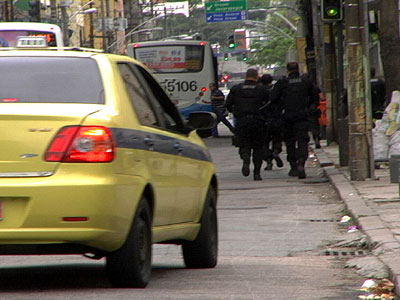
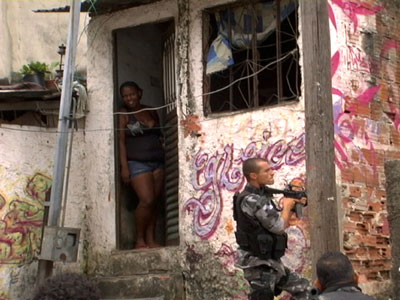
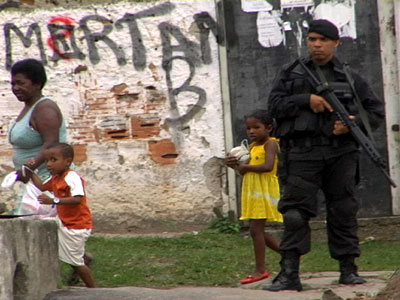
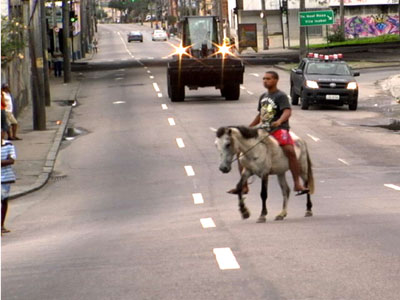
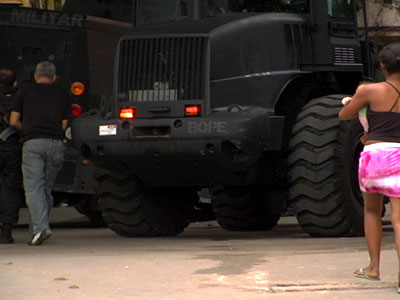
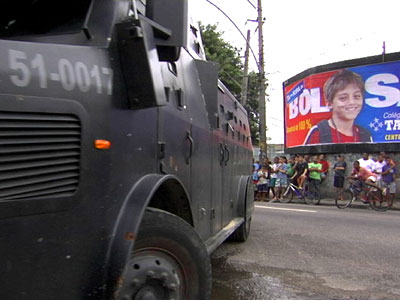
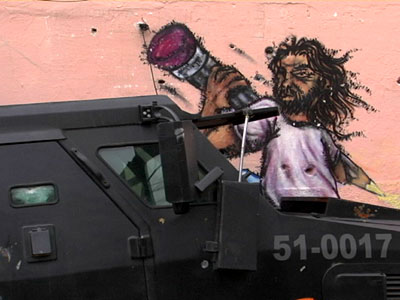
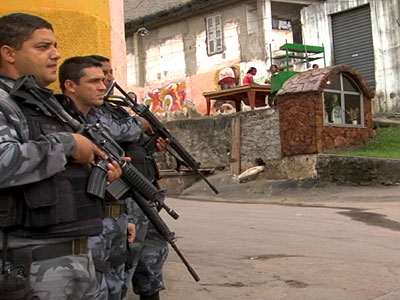
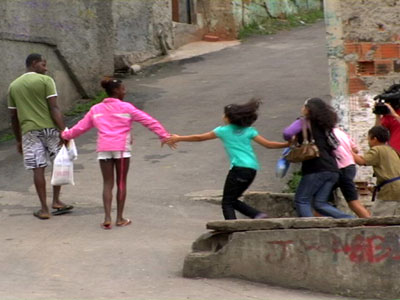
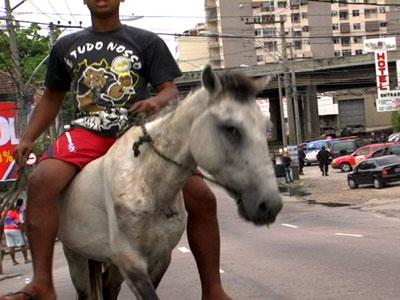
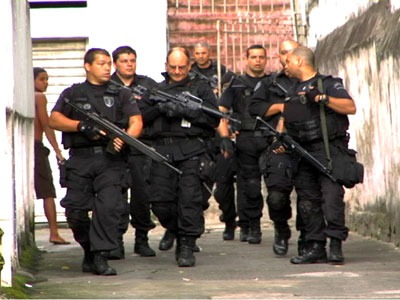
There are around 6,000 homicides a year in the whole state of Rio, which has a population of 14 million. A police ‘pacification’ operation with permanent patrols has been underway for a year in five slums. With their increased presence in the slums, the police force gangs to fight over other areas.
Viva Favela [10] is a citizen media project that works with special bloggers and photographers who live in the shantytowns of Rio de Janeiro. The project is under the guidance of Content Editor Rodrigo Nogueira [11]. You may find more information on their official Twitter account [12] [pt] and in their Orkut community [13] [pt].
